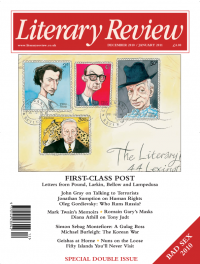Kathryn Hughes
‘Have You Got Their Letters?”
Imagine you’re a biographer and you’re attending one of those literary parties which, even in these straightened times, speckle December like a light falling of snow. You find yourself in conversation with a novelist/a poet/someone who simply turned up with a friend and is wondering how soon they can leave without looking rude. Your inter-locutor asks you politely ‘who are you working on?’ and you tell them. They may have heard of your putative subject, or they may not have a clue who you are talking about. But their next question will always be the same: ‘have you got their letters?’
Letters, you see, are considered to be the purest source material that a biographer can access. With your subject’s letters, so the thinking goes, you’ve got a short cut to their very essence. For what are letters but bulletins from the front line of the psyche? Forget the

Sign Up to our newsletter
Receive free articles, highlights from the archive, news, details of prizes, and much more.@Lit_Review
Follow Literary Review on Twitter
Twitter Feed
It wasn’t until 1825 that Pepys’s diary became available for the first time. How it was eventually decrypted and published is a story of subterfuge and duplicity.
Kate Loveman tells the tale.
Kate Loveman - Publishing Pepys
Kate Loveman: Publishing Pepys
literaryreview.co.uk
Arthur Christopher Benson was a pillar of the Edwardian establishment. He was supremely well connected. As his newly published diaries reveal, he was also riotously indiscreet.
Piers Brendon compares Benson’s journals to others from the 20th century.
Piers Brendon - Land of Dopes & Tories
Piers Brendon: Land of Dopes & Tories - The Benson Diaries: Selections from the Diary of Arthur Christopher Benson by Eamon Duffy & Ronald Hyam (edd)
literaryreview.co.uk
Of the siblings Gwen and Augustus John, it is Augustus who has commanded most attention from collectors and connoisseurs.
Was he really the finer artist, asks Tanya Harrod, or is it time Gwen emerged from her brother’s shadow?
Tanya Harrod - Cut from the Same Canvas
Tanya Harrod: Cut from the Same Canvas - Artists, Siblings, Visionaries: The Lives and Loves of Gwen and Augustus John by Judith Mackrell
literaryreview.co.uk